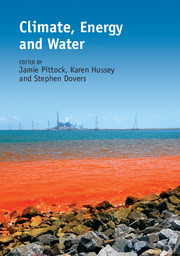Book contents
- Frontmatter
- Contents
- List of contributors
- Acknowledgements
- 1 Justifying, extending and applying “nexus” thinking in the quest for sustainable development
- 2 Water resources, climate change and energy
- 3 Implications of climate change for energy systems in a multisectoral context
- 4 Fossil fuels and water: A complex and evolving relationship
- 5 Renewable energy and water
- 6 Hydropower within the climate, energy and water nexus
- 7 Water and biofuels
- 8 Trade-offs and synergies between water and energy use in rural Australia
- 9 Management of the urban energy-water nexus
- 10 Managing the electricity-water nexus in China, France, India and the United States
- 11 Cross-sectoral governance of the climate, energy and water sectors: A ‘Rubik's cube’ analysis of cross-sectoral co-ordination
- 12 Regulation of the nexus
- 13 Climate, energy and water: the potential roles and limitations of markets
- 14 Strategies to mainstream climate change, energy, water and food security nexus knowledge and skills
- 15 A nexus of nexuses: systemic governance for climate response
- 16 Integrated modelling of the energy-water nexus in the American West
- 17 Biodiversity and the climate, energy and water nexus
- 18 Consumers, food supply chain and the nexus
- 19 Future prospects in climate, energy and water research and policy
- Index
4 - Fossil fuels and water: A complex and evolving relationship
Published online by Cambridge University Press: 05 April 2015
- Frontmatter
- Contents
- List of contributors
- Acknowledgements
- 1 Justifying, extending and applying “nexus” thinking in the quest for sustainable development
- 2 Water resources, climate change and energy
- 3 Implications of climate change for energy systems in a multisectoral context
- 4 Fossil fuels and water: A complex and evolving relationship
- 5 Renewable energy and water
- 6 Hydropower within the climate, energy and water nexus
- 7 Water and biofuels
- 8 Trade-offs and synergies between water and energy use in rural Australia
- 9 Management of the urban energy-water nexus
- 10 Managing the electricity-water nexus in China, France, India and the United States
- 11 Cross-sectoral governance of the climate, energy and water sectors: A ‘Rubik's cube’ analysis of cross-sectoral co-ordination
- 12 Regulation of the nexus
- 13 Climate, energy and water: the potential roles and limitations of markets
- 14 Strategies to mainstream climate change, energy, water and food security nexus knowledge and skills
- 15 A nexus of nexuses: systemic governance for climate response
- 16 Integrated modelling of the energy-water nexus in the American West
- 17 Biodiversity and the climate, energy and water nexus
- 18 Consumers, food supply chain and the nexus
- 19 Future prospects in climate, energy and water research and policy
- Index
Summary
Introduction
Where are we heading with the energy sector's water use? The energy sector's aggregate global water consumption is projected to increase; this is largely because more bioenergy and fossil fuel use is anticipated. Whether the energy sector actually uses more water in the future will depend in part on whether technologies can decouple fossil fuel use and bioenergy production from freshwater consumption and on the policies and market conditions that shape the relative attractiveness of fossil fuels and bioenergy vis-à-vis conservation, efficiency and other sources of energy. The focus herein is on the fossil fuel–water relationship.
Fossil fuels have played a significant role in global economic growth and are poised to continue their domination of the energy sector, even as increasing attention is given to their climate, water, environmental and health impacts. Water is either an essential input or one that is difficult or costly to substitute for current conventional and unconventional fossil fuel production and use. Major investments are being made or contemplated globally for how to meet future fossil fuel demand. These investments are often capital intensive, bulky and long-lived. Consequently, the energy trajectory established in the near term may influence fossil fuels'use of, dependence on and impacts on water resources for decades.
In order to understand where we are heading with the fossil fuel–water relationship, this chapter explores how the fossil fuel sector currently relies on water. It discusses how oil and natural gas from traditionally unconventional sources are raising water quantity and quality concerns, and how electric power generation is vulnerable to water availability. Finally, it presents policy options for managing the fossil fuel–water resource relationship. While this chapter presents a snapshot of the current relationship between fossil fuels and water, it is important to remember that relationships often evolve either through intentional action or through unanticipated developments.
- Type
- Chapter
- Information
- Climate, Energy and Water , pp. 45 - 64Publisher: Cambridge University PressPrint publication year: 2015
- 1
- Cited by



